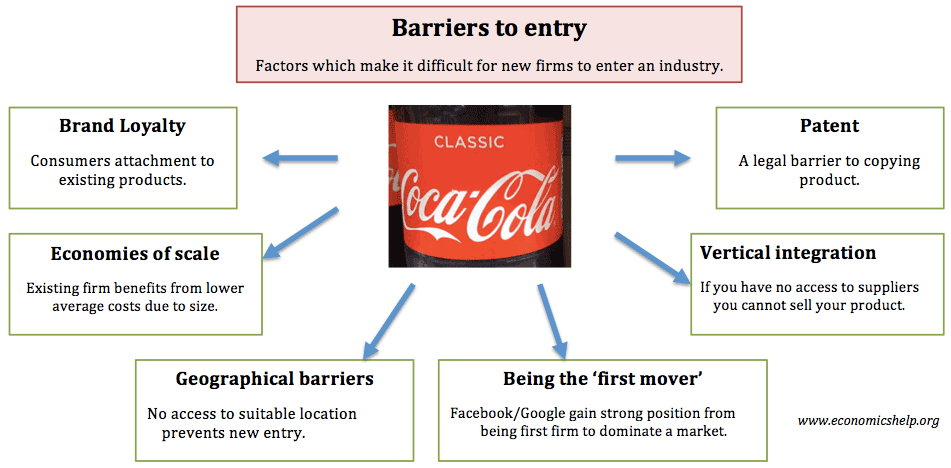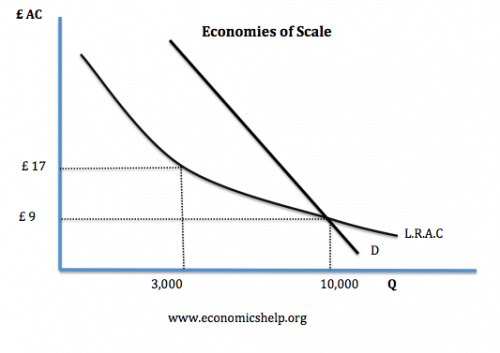Business Definition Barriers to Entry
Barriers to entry are factors that make it difficult for new firms to enter the market.
Barriers to entry will make a market less competitive. If barriers to entry are very high then the market will invariably become a monopoly.
Examples of barriers to entry

- Tap water – Economies of Scale. This means as firms produce more their average costs fall. Therefore, it is difficult for new, small firms to enter the market and be competitive. For example, a market like tap water is a natural monopoly. There is no point for a new firm to create the national infrastructure of a rival system of water pipes.

Current industry demand is 10,000. At this Q, average costs are just £9.
If a new firm enters at Q of 3,000, then average costs will be higher at £17.
- Soft drinks – brand loyalty. Some firms have high degrees of brand loyalty. This means consumers are loyal to the existing brand and firm. It means that a new firm would have to spend a lot of money on advertising to create its own brand loyalty. For example, Coca-Cola has a marketing budget of $4bn a year (2016). Coca-Cola has been very successful in creating very strong brand loyalty. Other barriers to entry are relatively low. Supermarkets often bring out their own brand colas at relatively low cost. In blind tastings, people often cannot even distinguish coca-cola. However, the brand loyalty and power of marketing means that new entrants have often failed to make a dent in the market. For example, Virgin Cola was introduced by Richard Branson in 1994. However, by 2002, the company had fallen into administration and the brand ended.
- Gold – Geographical barriers. Some industries are specific to a certain area. This means that new firms cannot enter unless they have access (e.g. mining industries) The presence of gold is purely geographical. Some regions are quite high in gold, but, if you don't have access to these gold mining regions, you cannot effectively enter the industry.
- Pharmaceutical drugs / patents. Many drugs are protected by legal patents. Therefore, another drug company cannot produce – even if it would be very profitable to do so. It is an effective way to prevent competition.
- Printer ink cartridges. Some makes of printers try to prevent other companies selling cheaper replacement ink cartridges. The printing companies place chips in their printers, so they can check with cartridges are compatible. This is a strong barrier to entry for selling re-usable cartridges. Printers do this to make monopoly profits on ink – often happy to sell the actual printer at a loss.
- Major airlines with landing slots at major airports. At major airports such as Heathrow, landing slots are all taken by the main airline carriers. Therefore, even if you wanted to set up a business flying London to New York, you are unable to get access to a popular airport. This creates a strong barrier to entry.
- Facebook – The first firm to gain a foothold in an industry. With a company like Facebook, they have come to dominate the market for social media/personal profiles. It is hard for a new social media company because a key aspect of the industry is the network effects – the most logical step is to join a network with the most users. A new company with a very limited number of users – is the least successful. New firms can enter if they appeal to a particular niche group. But, it is hard to displace Facebook from their position of dominance. It is a similar situation for a company like Uber – being the first firm helps create brand loyalty and create a framework which is more difficult for new firms to enter.
Which industries would be difficult to enter and why?
Another way of thinking about barriers to entry – is why would it be difficult to enter a particular industry?
- Newspapers – readers have strong brand loyalty to existing papers. Also, the industry is in decline and not very profitable. There are also economies of scale in producing a national paper. You have to pay journalists and printers – even with small national circulation.
- Trains between major city. Here the barrier to entry is the huge cost of investment before any revenues can be earnt.
Which industries would be relatively easy to enter and why?
- Clothing. Clothing is an industry where firms can exploit a niche market. Therefore, the need for economies of scale is less. Brand loyalty is important, but it doesn't necessarily come from expensive advertising campaigns. Good designs can lead to word of mouth and personal recommendations which help to create a better brand image than mass-advertising.
- Coffee shop. Lower entry costs. A firm can rent a building and there are limited fixed costs in setting up. Some customers will be attracted by smaller independent labels. Brand loyalty isn't everything. Customers who are picky may get fed up of big chains like Starbucks for being too commercial.
Related
- Barriers to Entry
We use cookies on our website to collect relevant data to enhance your visit. Our partners, such as Google use cookies for ad personalization and measurement. See also: Google's Privacy and Terms site By clicking "Accept All", you consent to the use of ALL the cookies. However, you may visit "Cookie Settings" to provide a controlled consent. You can read more at our privacy page, where you can change preferences whenever you wish.
Business Definition Barriers to Entry
Source: https://www.economicshelp.org/blog/glossary/barriers-entry/